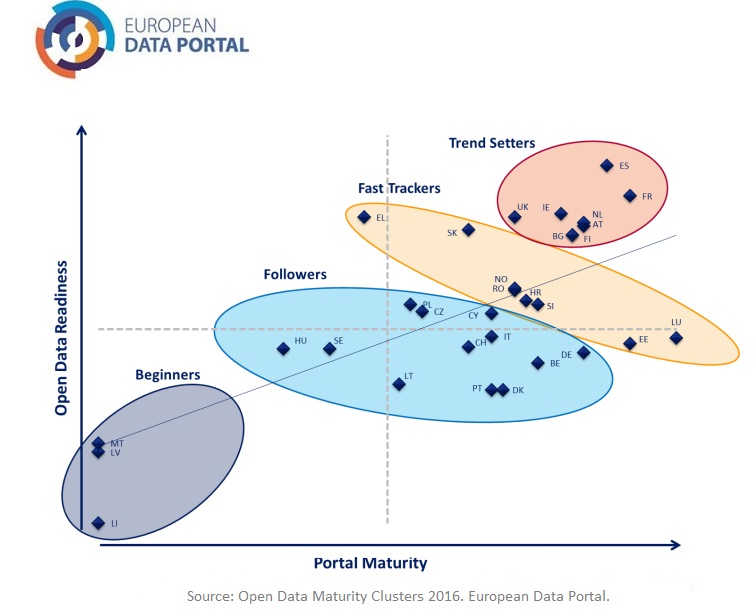Updated: 21/03/2024
On January 2023, the European Commission published a list of high-value datasets that public sector bodies must make available to the public within a maximum of 16 months. The main objective of establishing the list of high-value datasets was to ensure that public data with the highest socio-economic potential are made available for re-use with minimal legal and technical restriction, and at no cost. Among these public sector datasets, some, such as meteorological or air quality data, are particularly interesting for developers and creators of services such as apps or websites, which bring added value and important benefits for society, the environment or the economy.
The publication of the Regulation has been accompanied by frequently asked questions to help public bodies understand the benefit of HVDS (High Value Datasets) for society and the economy, as well as to explain some aspects of the obligatory nature of HVDS (High Value Datasets) and the support for publication.
In line with this proposal, Executive Vice-President for a Digitally Ready Europe, Margrethe Vestager, stated the following in the press release issued by the European Commission:
"Making high-value datasets available to the public will benefit both the economy and society, for example by helping to combat climate change, reducing urban air pollution and improving transport infrastructure. This is a practical step towards the success of the Digital Decade and building a more prosperous digital future".
In parallel, Internal Market Commissioner Thierry Breton also added the following words on the announcement of the list of high-value data: "Data is a cornerstone of our industrial competitiveness in the EU. With the new list of high-value datasets we are unlocking a wealth of public data for the benefit of all”. Start-ups and SMEs will be able to use this to develop new innovative products and solutions to improve the lives of citizens in the EU and around the world.
Six categories to bring together new high-value datasets
The regulation is thus created under the umbrella of the European Open Data Directive, which defines six categories to differentiate the new high-value datasets requested:
- Geospatial
- Earth observation and environmental
- Meteorological
- Statistical
- Business
- Mobility
However, as stated in the European Commission's press release, this thematic range could be extended at a later stage depending on technological and market developments. Thus, the datasets will be available in machine-readable format, via an application programming interface (API) and, if relevant, also with a bulk download option.
In addition, the reuse of datasets such as mobility or building geolocation data can expand the business opportunities available for sectors such as logistics or transport. In parallel, weather observation, radar, air quality or soil pollution data can also support research and digital innovation, as well as policy making in the fight against climate change.
Ultimately, greater availability of data, especially high-value data, has the potential to boost entrepreneurship as these datasets can be an important resource for SMEs to develop new digital products and services, which in turn can also attract new investors.
Find out more in this infographic:

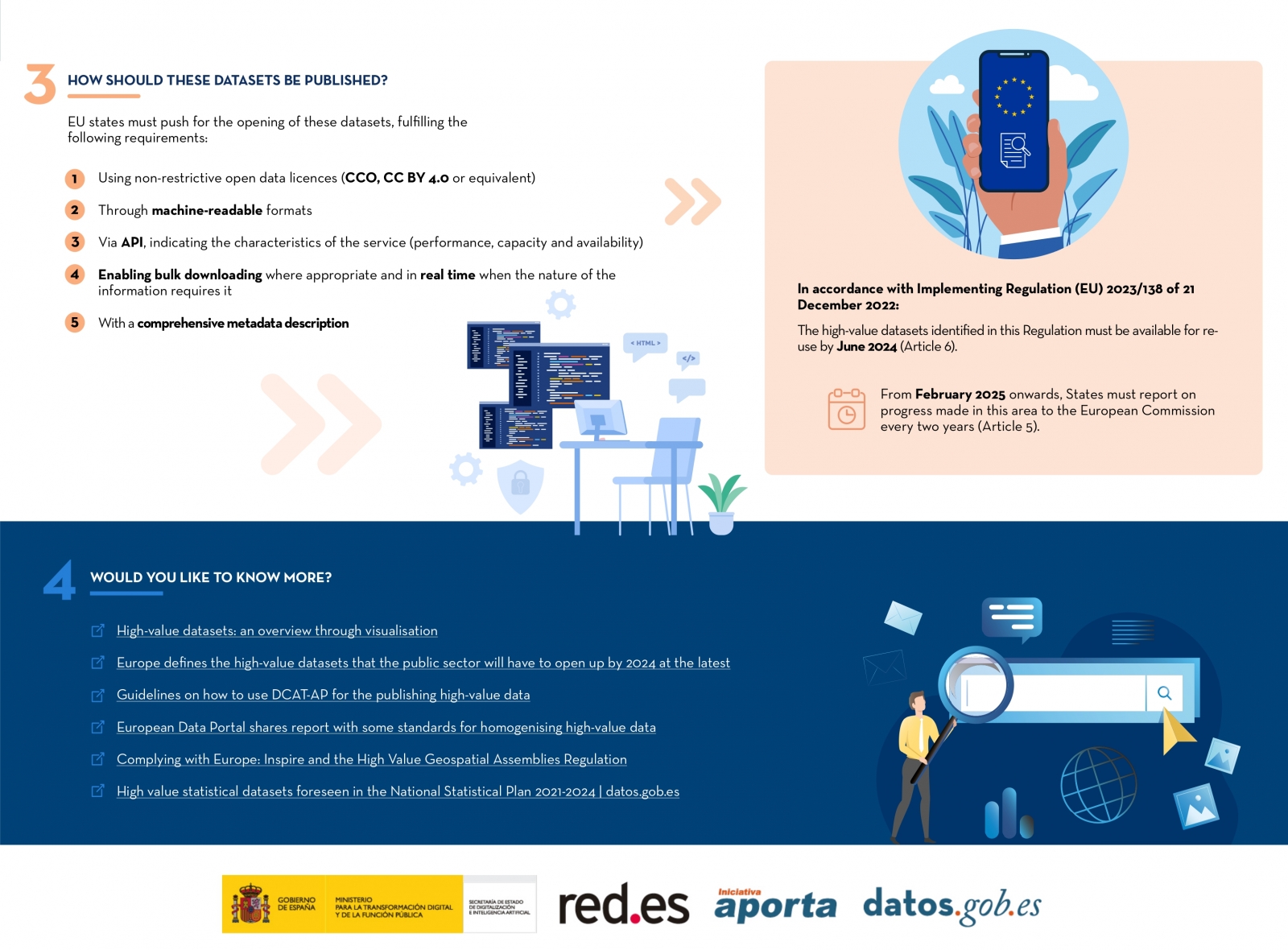
Access the accessible version on two pages.
The year ends and, as usual, the European Data Portal has just published its Open Data Maturity Report 2020, which measures the progress made by the different European countries in the field of open data. This year Spain has increased its overall score by 5% and remains in the leading positions, as a prescriber in the field of open data. Specifically, we are in second position, only behind Denmark.
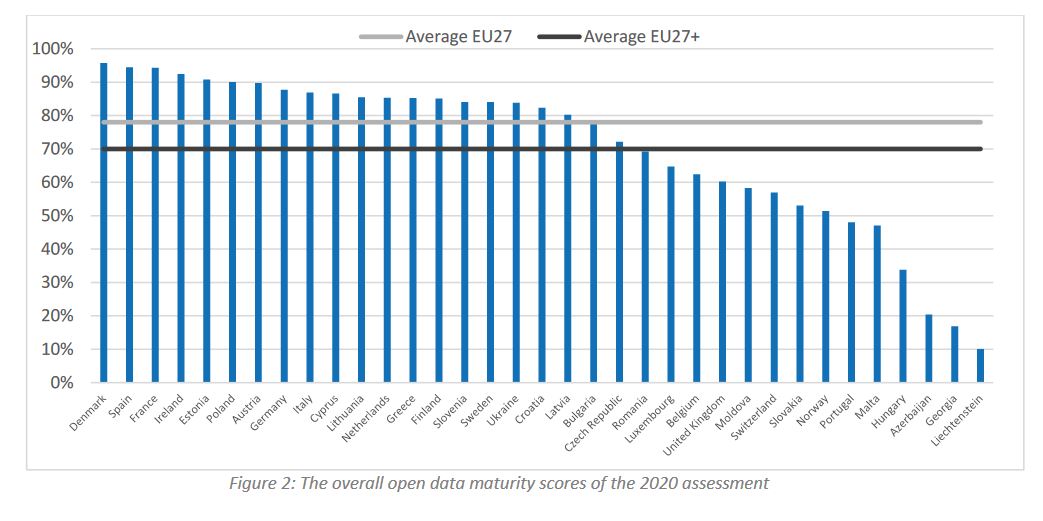
The report measures 4 indicators: policy, portal, impact and quality. As can be seen in the following image, Spain is ahead of the European Union in all the indicators.

- In the "political" dimension, which analyses the existing political and governance framework and level of implementation to promote data openness and reuse at the national level, Spain improved its score by 7%, from 89% to 96%. The highest score was obtained in the field of governance. The report also highlights how the "Aporta" initiative defines specific action plans each year. These consider the promotion of the reuse of data by both the public and private sectors.
- The “portal” dimension remains the same as last year, with a score of 89%, compared to 79% for the EU27. The EDP highlights that the portal uses monitoring and analysis tools to obtain information on user behaviour and provides an API through which advanced users can access metadata on a scheduled basis. It also highlights that a sustainability strategy has been defined for the portal and activities are being carried out to ensure its visibility.
- The "impact" dimension also remains the same, although in this case it was impossible to grow because we were already at 100% in 2019. It is in this area that we stand out most compared to the rest of Europe, where the average is 72%. The report shows that in our country the impact of open data is monitored in the political, social, environmental and economic areas, and highlights the data.gob.es applications and reuse companies sections that show numerous examples.
- The "quality" dimension has grown the most, from 81% to 93%. This indicator analyses the measures taken to ensure the systematic collection of metadata from sources throughout the country, the metadata available and the compliance with DCAT-AP, as well as the quality of the deployment of the published data. Spain scores highly on measures taken to monitor and assist publishers in publishing high-quality metadata.
The score obtained shows that we are still on the right track and shows us where we must continue to work, highlighting two barriers to be overcome:
- The complex administrative structure. The management of data production services is shared between the various levels of administration (local, regional and central). However, the report highlights that some regions have already taken steps to develop internal systems to harmonise data management in each of the institutions in order to ensure uniform resource identifiers (URIs), uniform data structures and a common vocabulary for high-value local government datasets.
- The need to encourage the publication of more high-value data. The EDP is based on the results of the last characterisation report of the infomediate sector, which indicated that 76.2% of the companies consulted demanded this type of information, but it also highlights that the growth of the national catalogue is continuous: between June 2019 and June 2020, the number of available datasets grew by 19% and the publishing entities by 10%.
The situation in Europe: Spain continues to be very well positioned as an open data prescriber
In general, European countries are increasing their level of maturity. The average has increased by 12 percentage points compared to 2019 (78% vs 66%). The vast majority of countries - in particular 18 - are above the EU27 average.
The report highlights a number of general trends in Europe's data world over the past year:
- A general growth of all indicators has been detected, showing that Europe is well on its way to achieving the targets set at European level for open data and their availability. The global pandemic highlighted the importance of systematically collecting data and making it available to the public. Policy" is the most mature dimension of open data, with an average score of 85%, while the lowest score is for "impact".
- As European countries' proposals for open data mature, data publishers have shifted their focus from the quantity of data available to ensuring its quality and interoperability as well. This aims to facilitate computerised data sharing within and between European countries and to encourage the re-use of data.
- An increasing number of countries are focusing on systematically measuring the impact of open data on society and the economy, although there is not yet a shared understanding of how to do this better. Many European countries, including Spain with experiences such as Aragón Open Data Focus, are successfully carrying out activities to understand and capture the extent to which open data is reused and how value is created, through collaboration with communities of reusers. The European Commission plans to develop a shared impact framework in the coming years based on these experiences.
As every year, the report establishes a ranking of countries and divides them into 4 categories: Beginners, Followers, Fast-trackers and Trend-setters.
Denmark is in first place in this year's evaluation, while Spain and France maintain their position compared to last year. The prescriber category is completed by Ireland - which last year was in first place and this year in fourth -, Estonia, Poland and Austria.

The report ends with a series of recommendations for the member countries in each of the ranking categories. In the case of the prescribers, it highlights the need to develop thematic communities that bring together suppliers and re-users; and to collaborate with other national open data teams, universities and research institutions, and the European Data Portal to develop an experimental impact assessment framework, among other issues.
In short, the report highlights the work carried out by all public administrations in Spain in promoting the openness and reuse of public sector data. This work will continue during 2021.
On June 12, the European Data Portal (EDP) organizes a webinar to explain the main conclusions of its latest report, entitled Analytical Report 13: Open Data best practices in Europe's Top Performers. This report analyses the success factors shared by the leading countries of open data in Europe: Spain, Ireland and France.
These three countries have been chosen for their top positions in the EDP open data maturity ranking. They are prescribers in terms of open data due to their high performance and clear strategic focus.
The webinar will start at 13:30 CET. It consist of a general overview on the following aspects:
- Good open data practices in Ireland, Spain and France.
- Common factors that helped boost the development of open data in the 3 countries. These factors can be used as a guide for those countries that want to improve their open data strategy.
- Trends and opportunities, both at the European Union and country level. The analysis will be based on the four EDP evaluation dimensions: Policy, Portal, Quality and Impact.
The webinar will include representatives of the national open data portals teams from Ireland, Spain and France, who will share their experience devising and executing an open data strategy. The speakers will be joined by Cosmina Radu, Service Delivery Lead of the European Data Portal and co-author of the report.
The webinar is free but you need to register through this registration form.
More information on the European Data Portal website and on social networks (Twitter, Facebook or LinkedIn).
The open data contribute to the political, social and economic sustainability of a country. The European Commission, aware of the value of the re-use of the public sector information for the eurozone growth, tracks regularly the state members in order to asses the progress achieved in their open data policies.
In this way, at the beginning of the year, the European Data Portal published its first report on the assessment of the maturity of the open data ecosystem: a detailed document where the results obtained by the EU28+ in 2015 are shown. Nevertheless, according to the monitoring performed by this initiative, the second edition of this study has been published, which shows the updated data from 2016 in comparison with the previous year.
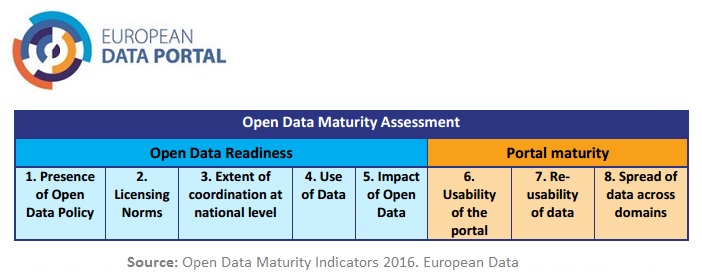
The measurement is built on two key indicators Open Data Readiness and Portal Maturity, thereby covering the level of development of national activities promoting open data as well as the level of development of national portals.
According to the document’s data, in 2016 the 31 countries assessed in this report progressed by 28.6% in comparison with the results obtained in 2015. In fact, all the nations have completed over 55% of their journey towards the openness of public sector information, showing that they have successfully developed a basic approach to address open data policies. However, significant discrepancies across countries still exist. Though some countries are still in the process of creating a national open data portal, other countries have already launched new initiatives and are redefining their multiannual strategy.
This reports has been accompanied with an interactive panel, published on the European Data Portal, which shows the results of the key performance indicators that assess the open data maturity. These KPIs include the level of development of the national open data policies, an assessment of the available characteristics in these platforms, as well as the expected impact of the open data policies.
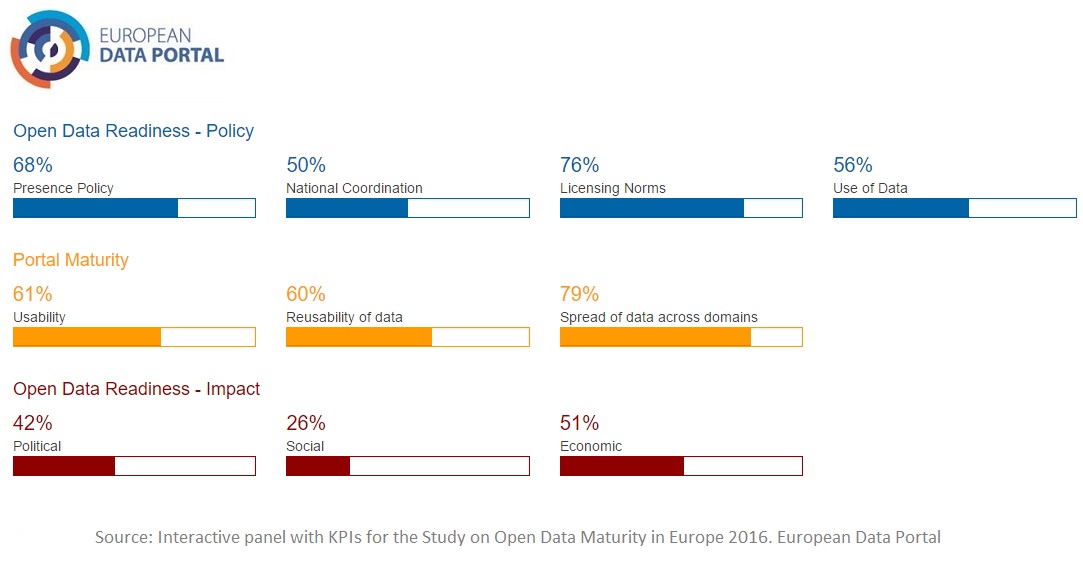
This online dashboard includes the information classified by country to help the user compare the existing differences in the openness of public data in the European Union. In this way, it is possible to create slides for each state member (together with Norway, Switzerland and Liechtenstein) to know all the details as regards their initiatives, catalogues, barriers, best practices, achievements and next steps.
Thanks to the analysis and summary done by the European programme, it is possible to know that Spain is in the first position in the EU, leading the ranking of open data maturity (as shown in the next figure), due to the high scores obtained in the different indicators: norms, policies, national coordination, portal usability, re-use or availability of the open data.
The greatest progress obtained by the country in comparison with 2015 has been the significant increase of open data impact, especially in the economic field. In fact, Spain scored the maximum of 120 points from 90 points scored in the previous year. It should be highlighted that only two countries have been identified as very ready, these are France (84.4%) and Spain (92.2%). Moreover, this last has done a great work to measure the social impact of open data, scoring the 100% of the possible points.
